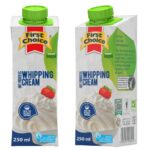
At the forefront of the push for food transparency and protecting our children, the Healthy Living Alliance (HEALA) has launched an innovative campaign called ‘Think Inside the Box’ to draw attention to the harmful ingredients found in ultra-processed foods. HEALA wants to make sure people understand why it’s important for government regulations to require businesses to put clear front-of-package warning labels on unhealthy packaged food.
In the lead up to the 21 July deadline for public comments on the draft government regulations, the campaign will help consumers understand what’s inside the products they consume. Children, in particular, are often the targets of aggressive food and beverage advertising campaigns, so bold warning labels are needed to help parents protect themselves and their children.
The centrepieces of the high-visibility activation, which runs from 14 – 27 July at the Sandton Gautrain Station in the heart of the Sandton CBD, is a series of life-size, 3D wire kids. Each interactive sculpture is filled with junk food and beverage cartons in a move designed to visually represent the composition of unhealthy diets and to emphasize how much we consume, and the importance of warning labels to enable us to make informed food choices. A QR code onsite links consumers to more campaign information and gives them the opportunity to comment on the draft regulations.
“By employing technology and innovative design, HEALA seeks to capture the attention and curiosity of consumers,” says Nzama Mbalati, Programmes Manager at HEALA. “The wire kids will serve as a powerful visual tool, exposing the harmful, hidden ingredients and unclear nutritional information of common food products, many of them aimed at children. Our objective is to encourage individuals to voice their support for regulations that would force businesses to put bold warning labels on unhealthy foods so that they can be easily identified.”
Overconsumption of packaged, ultra-processed food that often contains high levels of saturated fats, salt and sugar, can lead to people being overweight or obese and can cause as a range of diet-related noncommunicable diseases such as heart disease, stroke, diabetes and some cancers.
“More than 13% of South African children aged 6 to 14 years are overweight which is higher than the 10% prevalence in schoolchildren globally,” says Mbalati. “Excessive weight gain often puts children on the path to life-threatening health issues that were once considered adult problems, including diabetes, high blood pressure and high cholesterol. Childhood obesity can also lead to poor self-esteem and depression.”
A 2018 study in the Western Cape found that 80% of foods in South African supermarkets were ultra-processed. In addition, a public opinion survey, commissioned by The Community Media Trust and Vital Strategies in 2022, found that there was strong support for government to adopt front-of-package labels as a way to regulate unhealthy food access.
When the regulations are passed, front-of-package warning labels in the shape of a black triangle, will allow consumers to see the ingredients of a product at a glance, helping them to make healthier choices, and can also help to reduce levels of diet-related noncommunicable diseases. The passing of the regulations for the mandatory inclusion of front-of-package labels will empower consumers to limit ultra-processed foods and where possible, prioritise whole, fresh foods for both themselves and their children’s health and wellbeing.
“Transparency in food labelling is essential for consumer wellbeing. We are enthusiastic about the prospect of clear labelling, and we aim to captivate and engage individuals, urging them to advocate for policies that promote healthier food choices,” says Mbalati. “Together, we can create a healthier future.”
The Department of Health (DoH) gazetted the draft Regulations Relating to the Labelling and Advertising of Foodstuffs in April 2023 and has made the document available for public comment. Consumers have until 21 July to submit their comments in favour of new and bold front-of-package warning labels that will inform them of packaged food that is high in salt, sugar, saturated fat and contains artificial sweeteners.
- Automation and AI: Super-Tools to level up your business - 24th July 2024
- Salesforce Launches First Autonomous AI Agent - 19th July 2024
- WPP champions inclusive creativity at inaugural Unite South Africa Awards during Pride Month - 19th July 2024





